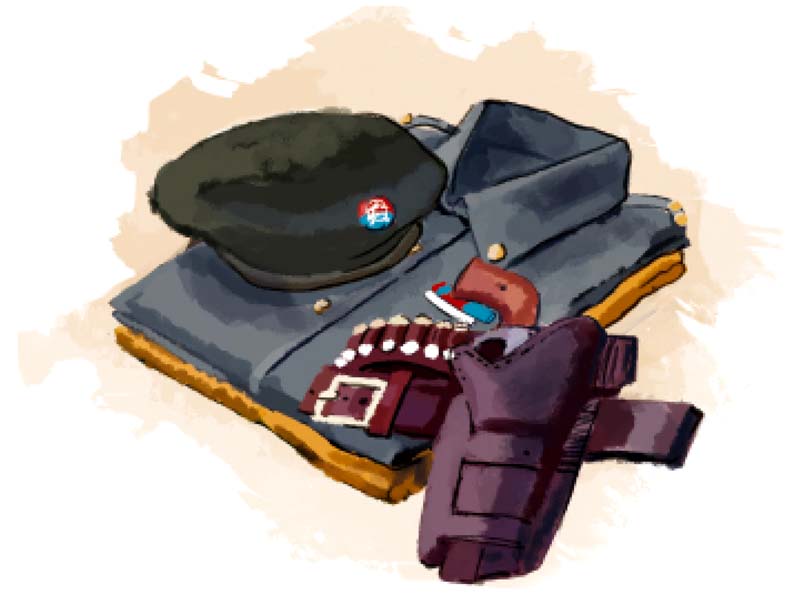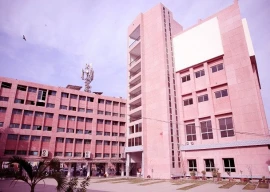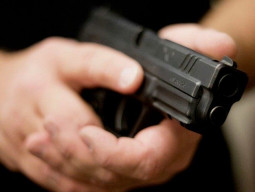
There was a time when the SHO of Lyari’s Kalakot police station could count how many times he went home on his fingers — it used to be once every couple of weeks, then months and then even less.
“I don’t remember how many times I went home last year,” he said. “Sometimes there just isn’t time. There is too much work at the station and on ground.”
SHO Sanaullah is not alone. He might be one of the most experienced men on the ground but sometimes he, too, yearns to go home and get away from the daily hand grenade attacks, raids and encounters.
There are several policemen in the area who are stuck at the station and go on for days without spending a night in their own bed at home or eating their mothers’ home-cooked meals.

The job
There are about four police stations in Lyari — Kalakot, Chakiwara, Baghdadi and Kalri. About 400 men are deployed in Lyari to cover 12 kilometres — there is a police station at every three. The men work in shifts of two in an area where more than a million people reside. Each police station has around seven police mobiles, six armoured personnel carriers (APCs) and around 20 check posts. “The situation here is different from other police stations,” said SHO Sanauallah. “Many of our men end up spending their days and nights on duty because of the work load. They are used to sleeping with their guns next to them as there is not a day which goes by without some sort of violence or crime taking place in the different neighbourhoods of Lyari.”
Breaking it down
The total strength of the Kalakot police station, for example is 125 men — with seven police mobiles, two APCs and three motorcycles. Per shift, they have around 60 men on duty. Out of this, 10 have to be at the station, 10 are on investigations, 12 are deployed at police posts and at the moment, at least eight are on medical leave.
This leaves around 20 policemen to patrol the area, carry out snap checks and conduct raids.
“Work keeps piling up,” said SI Mansoor of the Kalakot police station. “There is no time to go home. We have to go to local courts, jails, other police stations and monitor the gang war in the entire area round the clock. It is not easy.” He added that there were not enough hours in the day to complete their job.
Under pressure
According to DSP Anwar Ali Shah, this problem persists at all the police stations in Lyari. “The problem is that we don’t have enough men,” he said, while talking to The Express Tribune. “We have found a way to make things work for a while — we work as a team. It would be impossible to operate in this locality alone.” He added that they often called in men from other police stations for help in emergencies.
The battlefield
At the moment there are two major gangs operating in Lyari — Uzair Baloch and Baba Ladla. They are not just fighting law enforcers but also each other. The gangs mostly work within their own turf where they deal in drugs, gambling — they are also involved in kidnapping for ransom, target killings and attacks on law enforcers.
There are other smaller gangs that operate in the same area at a lower level and are usually affiliated with Uzair or Baba Ladla. Another king pin in the area is Ghaffar Zikri, the only one of the three big gang leaders who is actually present in the country. Uzair was arrested last year by the Interpol in Dubai and Baba Ladla’s whereabouts are unknown. Both men, however, have their commanders on ground to keep their business running and their turf protected.
Dealing with the gangsters is a routine part of the job for the police. SHO Sanaullah has come under fire — literally, several times when gang members hurled hand grenades at him and his men or opened fire at the police during an encounter or raid.
The operation
In an attempt to ‘clean up’ Lyari, the Sindh government launched the Karachi operation in September 2013. So far, more than 150 men from both gangs have been killed and several others were arrested. Despite this, the law enforcers have been unable to eliminate the gang war going on in Lyari.
Last year, the police came up with a new idea to combat the gang war — establishing more police stations. In November 2014, Sindh Chief Minister Qaim Ali Shah approved this plan but so far nothing has been done.
“The summary to establish five more police stations was prepared months ago,” said a senior police official. “The government approved the plan after some Pakistan Peoples Party workers were killed in Lyari.”
Not all police officers think, however, that this plan would help achieve anything. “We need more men, not police stations,” said an officer. “What will we do with more police stations when there are not enough men to do the work?” He added that, only in Lyari, they need about 100 check posts while each police station requires at least 300 men.
“We have the check posts,” another officer told The Express Tribune. “We just have no jawans to deploy there. We have mobile vans but no one to drive them or go on patrol in them. That is the real problem.”
According to Karachi AIG Ghulam Qadir Thebo, more police stations means more strength. “We want the strength but it is not something that can happen over night,” he said. “Initially we will have to post policemen by hiring them from other police stations.”
Published in The Express Tribune, March 29th, 2015.










1731481177-0/Untitled-design-(1)1731481177-0-270x192.webp)






COMMENTS
Comments are moderated and generally will be posted if they are on-topic and not abusive.
For more information, please see our Comments FAQ